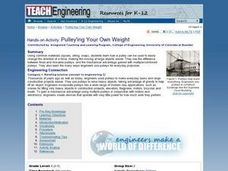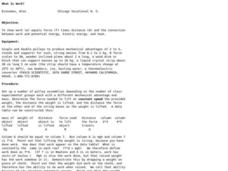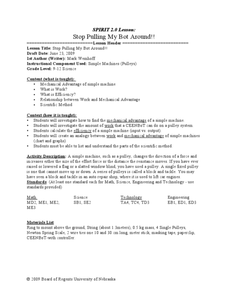Teach Engineering
Levers that Lift
Introduce your class to to the remaining three simple machines-- the lever, pulley, and the wheel-and-axle with a plan that includes the three different types of levers in the discussion of levers. The lesson continues with the...
Curated OER
Levers and Pulleys
Seventeen pages of material leave you well-prepared to carry out this lesson on levers and pulleys. Photos and diagrams make the instructions clear; resource links provide additional information. The missing aspects of this teacher's...
Curated OER
A Simple Block and Tackle Pulley Demonstration
High schoolers investigate the scientific concept of mechanical advantage. They construct their own system with the use of a simple broomstick. Then the demonstration is done to show how the mechanical advantage is used to move a load.
Curated OER
Inclined Plane and Pulley
Students describe how inclined plane and pulleys make work easier. In this physics lesson, students calculate work done and mechanical advantage of both simple machines. They collect data from the experiment and construct graphs.
Teach Engineering
Machines and Tools (Part 2)
Which pulley system will give us a whale of a good time? Teams compare the theoretical and actual mechanical advantages of different pulley systems. They then form a recommendation for how to move a whale from an aquarium back to the ocean.
Curated OER
Powerful Pulleys
Young scholars explore the building of a pyramid and how pulleys were used to change the direction of applied force. They demonstrate the mechanical advantage of using a pulley and apply it to modern engineering.
CK-12 Foundation
Block and Tackle
Can you easily lift more than your own weight? With a pulley system, almost anyone can manage this challenge. Scholars adjust the mechanical advantage (number of pulleys), weight of object being lifted, and the length of rope pulled. The...
Teach Engineering
The Advantage of Machines
Show your students how to make their work easier. The first lesson plan in a series of 10 introduces the class to work and the way simple machines can be make work easier. The simple machines scholars can find in everyday items are...
Curated OER
TE Activity: Pulley'ing Your Own Weight
Students experiment with common objects such as spools, string and soap to determine how pulleys make it easier to move large objects. They look at the difference between fixed and movable pulleys. They examine the many uses engineers...
Curated OER
The Lever Family
In this lever worksheet, students determine the ideal mechanical advantage for different classes of levers. This worksheet has 6 problems to solve.
Curated OER
Simple Machines and Mechanical Advantage
In this simple machines science worksheet, students read about simple machines, mechanical advantages, calculating mechanical advantage, output force versus input force, and distance effort versus distance of resistance. Then students...
Curated OER
Simple Machines and Mechanical Advantage
In this machines worksheet, students review the six simple machines and how to calculate mechanical advantage. Students complete 8 matching, 16 fill in the blank, and 6 problems to solve.
Curated OER
Pulleys
Students determine how to tell the difference between a simple system and a complex pulley system. Using pulleys, students build simple pulley systems to demonstrate the mechanical advantages of pulleys.
Curated OER
Simple Machines Worksheet
Simplify students' lives with this physical science note-taking guide. From inclined planes to moveable pulleys, this resource supports young scientists with defining each type of simple machine while identifying their mechanical...
Curated OER
Mechanical Advantage
In this mechanical advantage worksheet, students use the equation for mechanical advantage to solve for output force or input force. Students complete 3 problems.
Curated OER
Pulleys
In this simple machines worksheet, students learn about pulleys. They then answer the 11 questions on the page. The answers are on the last page of the packet.
Curated OER
What is Work?
Students investigate the connection between work, potential energy, kinetic energy, and heat. In this physics lesson plan, students use pulleys to produce mechanical advantages and incline planes to demonstrate energy conversion.
Curated OER
Is a Pulley a Special Kind of Lever?
Fifth graders use information from their text to read and discuss pulleys and levers. They examine a top sketch of the arrangement of a fixed pulley. Working in groups, 5th graders perform experiments to test the effect of using a pulley...
Curated OER
Investigating Pulleys
Students investigate pulleys and see how they have a mechanical advantage in lifting heavy loads. In this pulley lesson students make a hypothesis, complete and experiment then complete a worksheet.
Curated OER
Pulley Power
Third graders engage in a manipulative experiment in the mechanical advantage of simple machines. It graphically demonstrates the change in magnitude of applied force when using simple machines. Great for ESL to discover the ratio...
Teach Engineering
Not So Simple
Compound machines, nothing more than a combination of simple machines working together, are the focus of an activity that asks class members to use the provided information to take a look at the way innovators combine simple machines to...
Norwich Institute for Language Education
Simple Machines
Planning a unit on simple machines? Save some time and energy with this collection of lessons and activities that explores how these devices are used in the real world to make life a little easier.
Curated OER
Simple Machines-Pulleys
Third graders understand what a pulley is and how it works. In this simple machines, pulley lesson plan students experiment with broom sticks creating a pulley. Students observe how the pulley moves in its different trials.
Curated OER
Stop Pulling My Bot Around!
Students investigate the relationship between work and mechanical advantage. In this physics activity, students calculate the work and efficiency of pulleys. They identify the different types of pulleys.























